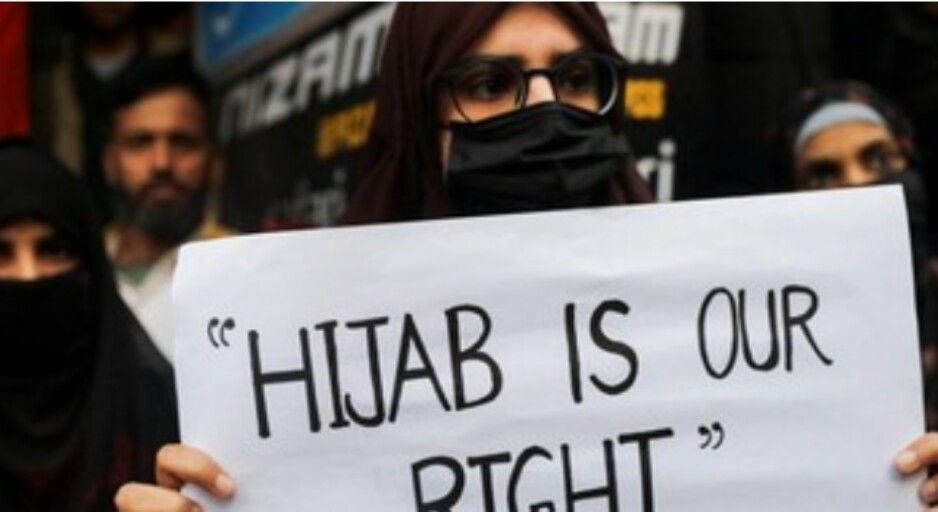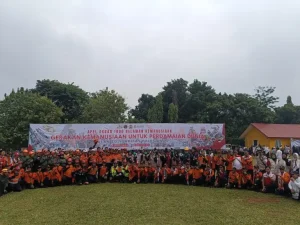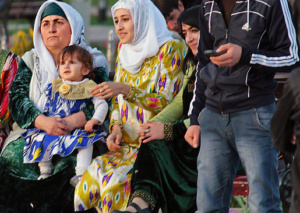Four days later, a group of 28 Muslim girls stood in protest in front of a Pre-University Junior college in Karnataka State, after they were barred from entering for wearing headscarves, a problem that has spread to other colleges in the southern state.
On Monday morning, February 7, 2022, Farheen (not her real name) and her friends were allowed into the campus which is located in the coastal city of Kundapur in Udupi district. However, they had to be surprised after the campus authorities did not allow them to sit in their respective seats in the classroom with other students.
That same day, college officials posted a notice outside the gates declaring a ban on headscarves in classrooms, as part of the college’s uniform code.
“Our teachers told us that they would not let us into the classrooms or teach us without government orders,” Farheen, a trade student, told Al Jazeera.
Also Read: The Forty-Four-Days of Glory: Azerbaijan’s Struggle for Justice and Peace
This made Farheen and her friends feel “hurt and humiliated”.
An official from the education department visited the girls as they sat in separate classrooms. “Take off your hijab. If you hold on to this, you will lose your education’, he told us,” recalls Farheen.
“Where is it fair if other students are taught and we are told to sit alone and study alone just because we wear the hijab,” said Farheen’s friend who also did not want to be named.
“All this time we used to sit in class with hijab. Now suddenly, they treat us like criminals and keep us in separate classrooms. We were hurt.”
Also Read: Palestine Solidarity Month: A Collective Movement for Al-Aqsa and Palestine’s Freedom
The Kundapur college’s decision to segregate Muslim girls, however, has angered students and activists who call it a form of “religious apartheid” and “untouchability”, referring to the prohibited practice of discrimination against members of lower castes in Hindu society’s religious hierarchy.
The Indian Campus Front (CFI), a Muslim student organization active in the southern Indian state said in a statement on Sunday, the hijab ban was “an organized national conspiracy [which] was systematically executed by the Hindutva right-wing [Hindu].” groups that dehumanize Muslim women.”
Anger and protest
The sight of female students being shut outside gates by several colleges in the state has caused growing anger among the Muslim minority and sparked protests since last week, with rights groups alleging that the move violated the rights of Muslim female students to practice their religion and access education.
Also Read: Hassan al-Turabi: A Controversial Thinker from Sudan
Tensions rose after students and activists allegedly backed by Hindu nationalist groups began wearing saffron-colored scarves, calling for a ban on the headscarf at educational institutions in the state, where Muslims make up 12 percent of the population.
On Tuesday, February 8, students and right-wing Hindu activists were seen marching to campus wearing scarves and turbans at colleges across the state. In some cases, they clashed with the police.
A viral video showing a hijab-wearing student booed by a group of Hindu men in Mandya district has caused outrage online, with many praising the girl for her bravery in fighting the “mobs”.
Karnataka Chief Minister Basavaraj Bommai of the Bharatiya Janata Party (BJP) announced a three-day closure of educational institutions across the state and called for calm.
Also Read: Who Exactly is the RSF Group Shaking Sudan?
“I appeal to all students, teachers and management of schools and colleges, as well as the people of Karnataka, to maintain peace and harmony,” Bomai said in a tweet.
Last week, his government issued a directive that all educational institutions must follow the dress code set by management.
Siddaramaiah, a former chief minister and leader of the state’s main opposition, blamed the government for “trying to create communal disharmony across the state in the name of the hijab.”
The government “denies education to Muslim girls”, he said.
Also Read: The Two-State Solution (Palestine–Israel) in Historical Perspective
Right to freedom of religion
On Wednesday, February 9, the state’s high court which heard the petition of Muslim girls to allow the wearing of headscarves in Educational institutions, had referred the case to a larger panel of judges.
Lawyers who were present for the girls Tuesday, argued before the court that the practice of the headscarf is protected under the right to religious freedom guaranteed in India’s constitution, the state has no power to prohibit.
Kaneez Fathima, a member of the state legislature from the opposition Congress party, who led a demonstration in the city of Kalburgi in support of girls, said she wears the hijab and sees it as an important part of a Muslim woman’s life.
Also Read: Enchanted by K-Dramas, Dragged into Slander: Time for Muslims to Rise!
“We have worn the headscarf for years without any problems, but now, this issue has suddenly been raised by the BJP and Hindutva groups to increase communal tensions,” she told Al Jazeera, referring to right-wing Hindu groups.
The hijab controversy first started a month ago, when a group of six Muslim female students at a government-run women’s college in Udupi district were denied entry to classrooms, because the government accused them of breaking the rules by wearing headscarves.
However, the girls resisted the pressure even when they were forced to sit outside the classroom on the stairs.
BJP Defends Ban
Also Read: Creating Opportunity and Avoiding Misery; Lesson Learn on Waste Recycling Issue
The controversy has reignited debate over the rights of India’s minorities under Hindu nationalist rule. Activists say attacks on Muslims and their religious symbols have increased under Prime Minister Narendra Modi.
The hijab ban comes as religious minorities, mainly Muslims and Christians, are facing attacks from right-wing Hindu groups in the state – home to India’s IT hub in Bengaluru. The Hindu nationalist BJP government in the state has passed a law banning the slaughter of cattle and anti-conversions believed to target minorities.
However, the governing BJP defended the hijab ban, arguing that it violated uniform rules.
“Educational institutions are not places to practice one’s religion. Girls should focus on education and come to college to study, not to assert identity,” Ganesh Karnik, the party’s spokesman, told Al Jazeera.
Also Read: Between the Treaty of Hudaybiyyah and Ceasefire in Gaza
He said it was a small group of female students who fomented the issue when the government on Monday ordered an investigation into the “private interest” role in supporting female students demanding the inclusion of hijab-wearing girls.
However, the girls say they cannot be forced to take off their headscarves.
“We can’t just let it go. This is targeted harassment by the authorities,” Al-Rifaa, a student from another college in Kundapur, told Al Jazeera.
“For the past 30 years, the campus has not had a problem with the hijab. Why is it suddenly a problem, what triggered this?” asked Rifaa. (AT/RE1)
Also Read: Peace Cannot Be Achieved Without a Palestinian State
Source: Rushda Fatima Khan’s writing on Al Jazeera
Mi’raj News Agency (MINA)
Also Read: Facing the Wall: Netanyahu and Ambitions Built on Blood






































 Mina Indonesia
Mina Indonesia Mina Arabic
Mina Arabic